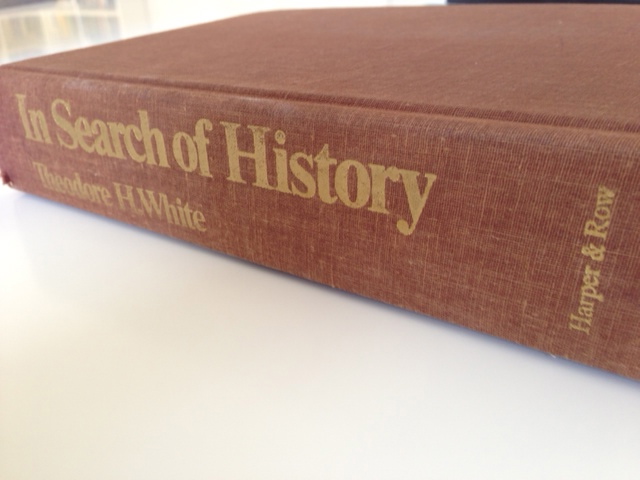

Every once in a while you come across a book that changes your life.
When I was in my early 20s and lost, as many 20-year-olds are, I came across In Search Of History, by Theodore White.
It set the path for the rest of my life.
White was perhaps the best known foreign correspondent that TIME magazine then had; then being 1978.
And what a life he lived. He traveled all over the world, always first class, thanks to TIME's limitless expense accounts; reported on the most important events of our time; and still found the time and energy to write books like The Making of the President. What a great job.
White had started out as a poor Jewish kid, a product of the Boston public school system. But he went to Harvard on a scholarship, studied Chinese (then a fairly esoteric exercise), and soon found himself in Beijing (or Peking as it was then known), working for Henry R. Luce and the Time magazine Empire. TIME became not just his employer, but his home for many years. TIME/LIFE provided him not only a fantastic lifestyle and a great income, but also a very powerful platform and entree to some to the most interesting moments in the 20th Century.
In 1978, I was in my early 20s, out of college, having studied Arabic (then a fairly esoteric pursuit) and in Afghanistan (before anyone knew where it was).
"That's the life for me," I said upon finishing the book, and promptly wrote to the managing editor, who just as promptly turned me down.
It was just as well.
Instead of writing for TIME magazine, I grabbed a small video camera, headed for the Gaza Strip and thought, "I can do this without TIME magazine if I have to." It turned out to be a prescient idea.
The life and power and prestige that TIME magazine bestowed upon Teddy White and many others like him has now ceased to exist. TIME is today but a memory of its former glory.
Last week, TIME announced that is was laying off 500 staffers.
There are probably more to follow.
What was once the crown jewel, not only in the TIME/LIFE Empire, but in the world of print journalism is but a mere shadow of its former self.
Go to a news stand and buy an issue. The staple is thicker than the magazine. It's like a consumptive patient on their death bed, thin, deathly pale, gasping for oxygen.
It's too bad, because the writing has never been better (in my honest opinion).
What happened?
TIME was once, along with its companion publication, LIFE, the lifeblood (so to speak) of American journalism. LIFE magazine was based on great photography. Stunning photography: from Margaret Bourke White to W. Eugene Smith and everyone inbetween. People used to wait with bated breath for each week's issue. To be on the cover of LIFE magazine (indeed, just to be in the copy) meant you had arrived.
Then came television, and within a very few years, LIFE magazine was over.
Now, the web has done to TIME what TV did to LIFE: made it superfluous.
It isn't that you can now get all the content online and for free (although that doesn't help). It's that in a world that is completely connected 24 hours a day, what is the point in sending a Teddy White to Beijing (or even Peking) to 'report' on what is 'going on'?
What is the point when there are 1 billion people in the world with smart phones that have video and still cameras?
This is the democratization of the media, and it's going to have as massive an impact on our world as the printing press had on democratizing writing. The printing press made it possible for anyone with an idea to publish. The iPhone and its companions make it possible for anyone with something to say or report, to do just that. And for free.
What then is the value of one American Harvard graduate who took a few courses in Chinese when you have a whole nation of people who speak the language, know the history, know the culture, know the issues, have the tools to create text, video and stills and send it out instantly?
The answer would be... none.
In fact, on the face of it, the whole idea of the 'foreign correspondent' looks increasingly ridiculous.
What is the value of flying Brian Williams and his whole team to 'anchor live' from Cairo, when he doesn't speak the language and barely knows the history or the issues?
The answer would be... none.
The notion that only "our kind of people" can report "the truth accurately" bespeaks a kind of subtle racism or colonialism that is still endemic in the world of journalism.
Take up the White Man's burden--
Send forth the best ye breed--
Go, bind your sons to exile
To serve your captives' need;
So farewell TIME magazine (and no doubt soon to follow, network news shows). You were great when the world was a much more inaccessible place.
But it isn't.
And that, in fact, is no bad thing.
